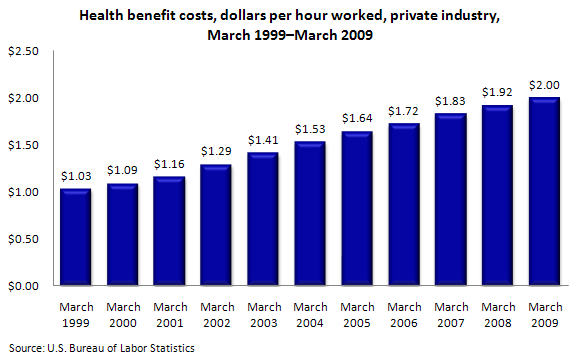Chart: Health insurance costs to employers and employees
Tags: business management, talent management
The average cost to private employers of providing health insurance to their employees increased from $1.03 per hour worked in March 1999 to $2.00 per hour worked in March 2009, which represents a change from 5.4 percent of total compensation to 7.3 percent of total compensation.
The cost to employees for health insurance has increased as well. The average flat-rate premium paid by private industry workers increased from $67.57 per month for single coverage in 2004 to $92.43 per month for single coverage in 2009, and from $264.59 per month for family coverage in 2004 to $349.36 per month for family coverage in 2009.
Although the costs for both employers and employees have increased, the proportion paid by each has remained about the same. Private employers’ share of the premium for single coverage was 82 percent in 2003, with employees responsible for the remaining 18 percent; in 2009, the employers’ share was 80 percent, compared with 20 percent for the employees. For family coverage, the employer paid 70 percent of the premium in 2003 and in 2009, and the employee paid 30 percent.
This data is from the Compensation Cost Trends program. To learn more, see "Consumer-Driven Health Care: What Is It, and What Does It Mean for Employees and Employers?" in the October issue of Compensation and Working Conditions Online.
